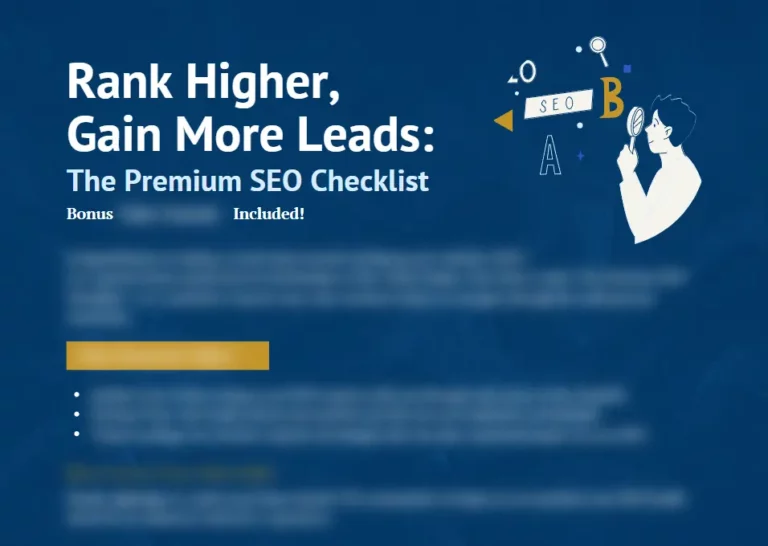Are you struggling to make sense of the myriad of SEO metrics and how they impact your website’s performance?
Understanding and effectively utilizing SEO metrics can be a daunting task, but it’s essential to stay ahead in the ever-evolving digital landscape.
In this comprehensive guide, we’ll demystify the most important SEO metrics, dive into advanced metrics for in-depth analysis, and share tips and tricks for leveraging these metrics to improve your website’s performance.
TL:DR
- Tracking SEO metrics is essential for optimizing website visibility and driving organic traffic.
- Monitor key SEO metrics such as organic traffic growth, keyword performance, backlinks & user engagement to maximize search rankings.
- Leverage advanced tools and resources from a professional agency to improve website performance & generate greater revenue.
Why Tracking SEO Metrics Matters
Monitoring important SEO metrics is not just a buzzword; it’s the key to optimizing organic search performance, recognizing areas for development, and staying ahead of the competition.
But why is it so crucial to keep a close eye on these metrics?
The answer is simple: consistently monitoring critical SEO metrics ensures that your website functions optimally and yields the desired results.
Failing to monitor SEO metrics could lead to a lack of visibility into potential opportunities to expand organic search traffic and revenue.
Moreover, it could result in an inability to identify potential threats to existing traffic and business.
On the other hand, the advantages of monitoring SEO metrics are numerous.
For instance, monitoring the Health Score provides visibility into changes in your SEO performance relative to prior crawls, including specific errors that contributed to such changes.
Furthermore, optimizing for other SEO metrics is simplified, ensuring you stay at the top of your game.
So, whether you’re just starting with SEO or have been in the game for a while, it’s crucial to track SEO metrics.
In the following sections, we’ll explore the most important SEO metrics to monitor and share tips on how to leverage them for optimal performance.
Essential SEO Metrics to Monitor
Before diving into the nitty-gritty, it’s important to understand the essential SEO metrics that every website should monitor.
These fundamental metrics include:
- Organic traffic growth
- Keyword performance
- Backlinks and referring domains
- User engagement metrics
- Core Web Vitals and page speed
By keeping a close eye on these metrics, you’ll be better equipped to improve your website’s visibility on search engines and drive more organic traffic to your site.
Let’s explore each of these crucial metrics in more detail.
Organic Traffic Growth
Organic traffic growth is a crucial indicator of SEO success, as it provides quantifiable evidence of increased visitors to your website.
Tracking organic traffic can be done using tools such as Google Analytics, which allows you to monitor and analyze the number of visitors to your website from organic search results.
By tracking this metric, you can assess the effectiveness of your SEO strategies and make necessary adjustments to ensure continued growth.
However, it’s also important to consider other SEO metrics in conjunction with organic traffic numbers to evaluate the quality of traffic.
For example, you might want to analyze user engagement metrics, such as bounce rate and pages per session, to gain a more comprehensive understanding of how visitors interact with your site.
Using tools like Google Analytics and Semrush can help you track organic traffic and gain valuable insights into user behavior.
By monitoring organic traffic growth and making data-driven adjustments to your SEO efforts, you can ensure that your website continues to attract more visitors and drive greater revenue.
So, make sure to regularly track this metric and adjust your strategies accordingly to stay on top of your game.
Keyword Performance
Keyword performance plays a vital role in optimizing content and ensuring the appropriate audience is targeted.
To monitor keyword performance, you can use tools like SEMrush or Ahrefs, which provide valuable insights into how well your website is ranking for its target keywords.
Utilizing a third-party rank tracking tool like Ahrefs’ Rank Tracker is recommended for monitoring keyword rankings most effectively.
This tool provides regular email alerts regarding tracked keyword progress and generates reports, giving you a comprehensive overview of your website’s performance in organic search results.
In addition to traditional rank tracking tools, organic keyword reports offer a more comprehensive view of keyword rankings by automatically tracking all the keywords your site ranks for.
By leveraging these tools and insights, you can optimize your content for higher search engine rankings and, ultimately, drive more traffic to your website.
Backlinks and Referring Domains
Backlinks and referring domains are essential for optimizing search rankings, as they are reliable indicators of your website’s authority and relevance.
Here are some key points to remember.
- Backlinks are links from external sources that link to your site.
- Referring domains indicate the number of distinct domains with links pointing to you.
- To evaluate the quality and relevance of backlinks and referring domains, you can use tools like Majestic or Moz.
- These tools can help you identify and analyze the websites linking to your site, allowing you to gauge the impact of your link building efforts on your search rankings.
It’s important to remember that not all backlinks are created equal.
Pages with a greater number of backlinks from reputable domains are more likely to achieve higher search rankings.
By focusing on acquiring high-quality backlinks and monitoring their impact on your search rankings, you can improve your website’s authority and drive more organic traffic.
User Engagement Metrics
User engagement metrics, such as bounce rate, pages per session, and average session duration, provide insights into user behavior and can help identify areas for improvement.
These metrics can be tracked using Google Analytics, which allows you to monitor how users interact with your website and gauge the effectiveness of your content and SEO efforts.
To get the most out of user engagement metrics, it’s essential to analyze them at the page level.
For instance, a high exit rate on a particular page may indicate that the page or its content requires improvement.
Similarly, a low pages per session metric may point to the fact that the content is not engaging or relevant enough for visitors to explore additional pages or that the site navigation is not user-friendly.
By closely monitoring user engagement metrics and making data-driven adjustments to your content and website structure, you can improve user experience and, ultimately, boost your search engine rankings on search engine results pages.
Core Web Vitals and Page Speed
Core Web Vitals and page speed are important for user experience and search rankings.
Core Web Vitals are user-centric performance metrics that measure page load time in a more precise and user experience-focused manner.
These metrics have been incorporated as minor ranking factors by Google since June 2021, highlighting the importance of optimizing them for improved search rankings.
To measure Core Web Vitals and page speed, you can use tools like Google PageSpeed Insights or Lighthouse.
These tools provide insights into your website’s performance in terms of loading, interactivity, and visual stability, allowing you to identify and address any issues that may be negatively impacting user experience and search rankings.
In addition to Core Web Vitals, page speed is a critical ranking factor for SEO on both desktop and mobile.
By monitoring and optimizing these metrics, you can ensure that your website delivers an exceptional user experience, ultimately boosting your search engine rankings and driving more organic traffic.
Advanced SEO Metrics for In-Depth Analysis
While the essential SEO metrics covered in the previous sections provide a solid foundation for monitoring your website’s performance, there are also advanced SEO metrics that can offer more in-depth insights.
In this section, we’ll discuss search visibility and market share, conversion rates and goals, indexing and crawl errors, as well as the importance of a specific SEO metric.
Additionally, we will explore some SEO metrics to track for a more comprehensive understanding of your website’s performance.
By incorporating these advanced metrics into your SEO analysis, you can gain a deeper understanding of your website’s performance and identify areas for improvement that may not be apparent from the essential metrics alone.
Search Visibility and Market Share
Search visibility and market share metrics are crucial for tracking your overall SEO performance and competitiveness in the market.
Search visibility is a metric that gauges how easily your page is discoverable by users on the search engine results page (SERP).
Tools like Similarweb can be used to assess search visibility and market share.
By monitoring these metrics, you can gain a better understanding of your website’s performance in comparison to your competitors and identify areas where you may need to improve your SEO efforts to increase your share of the market.
In addition to search visibility, search engine market share is an important metric to consider.
By analyzing search engine market share, you can:
- Identify which search engines are driving the most traffic to your website
- Optimize your SEO efforts accordingly
- Make more informed decisions about where to allocate your resources
- Focus your SEO strategies
This information can help you improve your website’s performance and increase your online visibility.
Conversion Rates and Goals
Conversion rates and goals are vital for assessing the effectiveness of your SEO efforts in prompting desired actions on your website.
By tracking conversion rates and goals, you can measure the effectiveness of your content and SEO strategies in driving traffic.
- Sales
- Leads
- Sign-ups
- Downloads
- Page views
Google Analytics and other conversion tracking tools can be used to monitor conversion rates and goals.
By analyzing these metrics, you can identify areas where your content and SEO efforts are succeeding in driving user actions, as well as areas where improvements may be needed.
Using conversion rates and goals to inform your SEO strategies can help you optimize your website for better user experience and higher search engine rankings.
By focusing on driving desired actions, you can ensure that your SEO efforts are aligned with your overall business objectives and deliver a higher return on investment.
Indexing and Crawl Errors
Indexing and crawl errors can have a significant impact on your website’s search rankings.
Identifying and fixing these errors is essential for maintaining a healthy website and ensuring optimal performance in search results.
Tools like Google Search Console or Screaming Frog can help you identify and address indexing and crawl errors.
Index coverage errors, for example, are issues that prevent pages from being indexed, unless intentionally done so using the noindex robots meta tag.
Monitoring the number of indexed pages and identifying any issues can be done using Google Search Console, which provides information on why a page may not be indexed.
By actively monitoring and addressing indexing and crawl errors, you can maintain a robust website and ensure that your content is properly indexed and accessible to users searching for relevant information.
This, in turn, will help improve your search engine rankings and drive more organic traffic to your website.
Tips for Leveraging SEO Metrics to Improve Performance
Now that we’ve covered the essential and advanced SEO metrics, it’s important to know how to leverage them effectively to improve your website’s performance.
Here are some tips to help you get the most out of your SEO metrics.
- Set benchmarks:
Establishing benchmarks for your key SEO metrics allows you to track your progress over time and identify areas where improvements are needed. - Prioritize high-impact metrics:
Focus on the metrics that have the most significant impact on your website’s performance and search rankings, such as organic traffic growth, keyword performance, and backlinks. - Use data-driven insights:
Analyzing your SEO metrics and KPIs can provide valuable insights to inform your SEO strategies and decision-making.
By leveraging these tips and regularly monitoring your SEO metrics, you can make data-driven decisions to improve your website’s performance in search results and drive more organic traffic.
Professional SEO Metric Analysis and Optimization
Understanding and effectively leveraging SEO metrics is crucial for optimizing your website’s performance in search results and driving more organic traffic.
While monitoring and leveraging SEO metrics on your own can be effective, engaging a professional SEO agency can provide even greater benefits and ongoing support to ensure optimal performance and return on investment.
Whether you choose to tackle SEO metrics on your own or partner with an SEO agency, staying on top of these key metrics will ensure your website continues to thrive in the ever-evolving digital landscape.
Frequently Asked Questions
What are the most important SEO metrics to monitor?
Organic traffic growth, keyword performance, backlinks and referring domains, user engagement metrics, and Core Web Vitals and page speed are all essential indicators to monitor for successful SEO strategy.
How can I track keyword performance?
Tracking keyword performance is possible through the use of various tools such as SEMrush and Ahrefs, which offer detailed data about your website’s search engine rankings. With their insights, you can track and optimize the performance of your keywords.
What tools can I use to monitor organic traffic growth?
Monitoring organic traffic growth is easily done by leveraging tools such as Google Analytics, which will help you track how many visitors are coming to your website from organic search results.
These tools can provide valuable insights into how your website is performing in terms of organic search traffic, and can help you identify areas for improvement.
How can I improve my website’s search visibility and market share?
By following best practices for SEO, implementing regular analytics tracking, and staying up-to-date on industry trends, you can make sure your website is well positioned to boost search visibility and market share.
This can be achieved by optimizing content for search engines, creating content that is relevant to your target audience, and using social media to promote your website. Additionally, you should ensure that your website is mobile-friendly and that it loads quickly.




